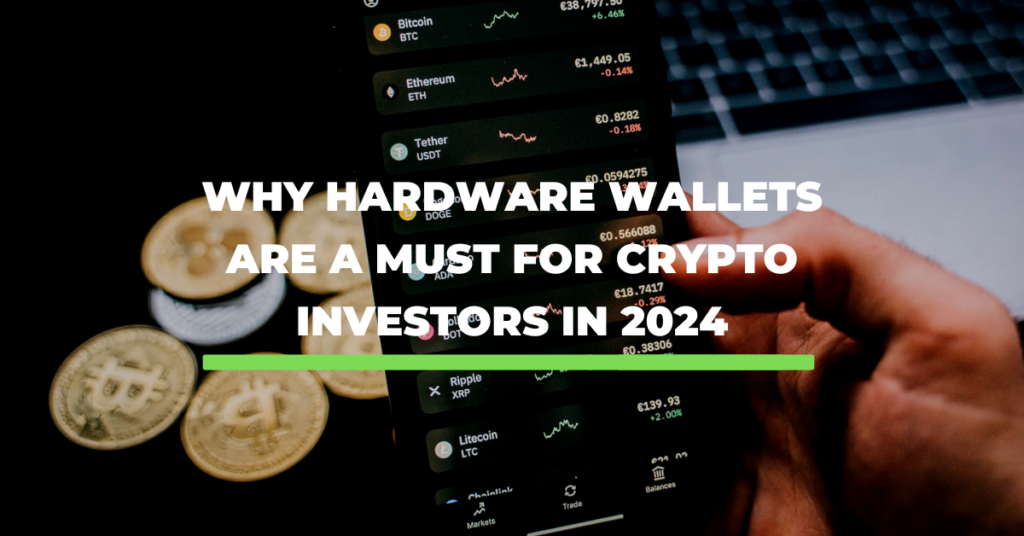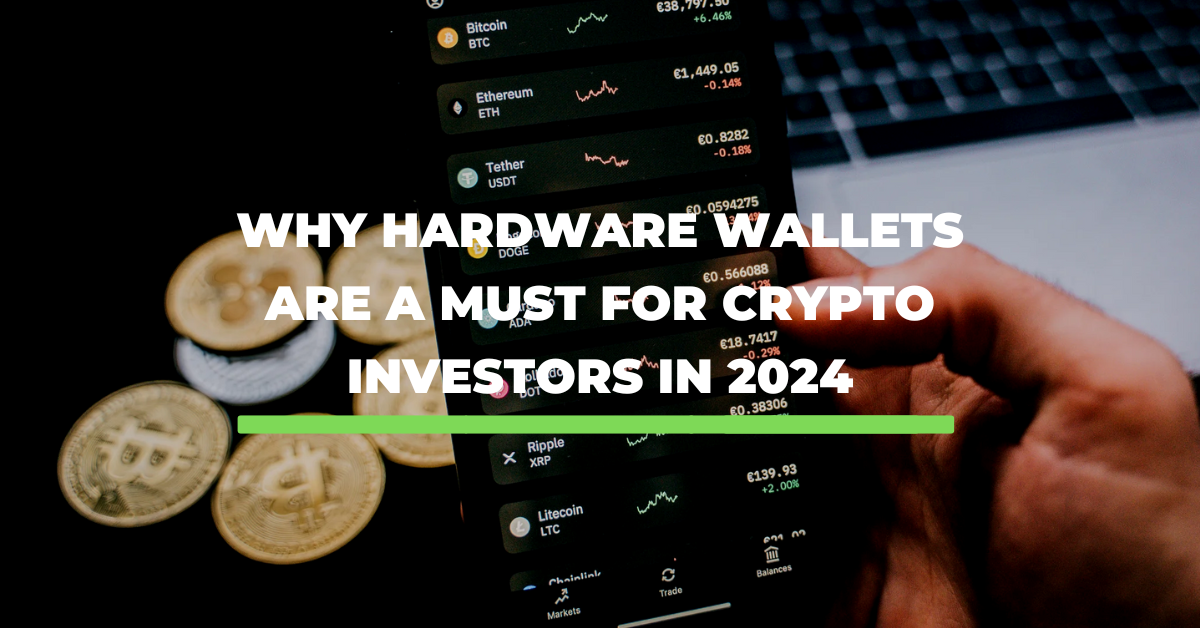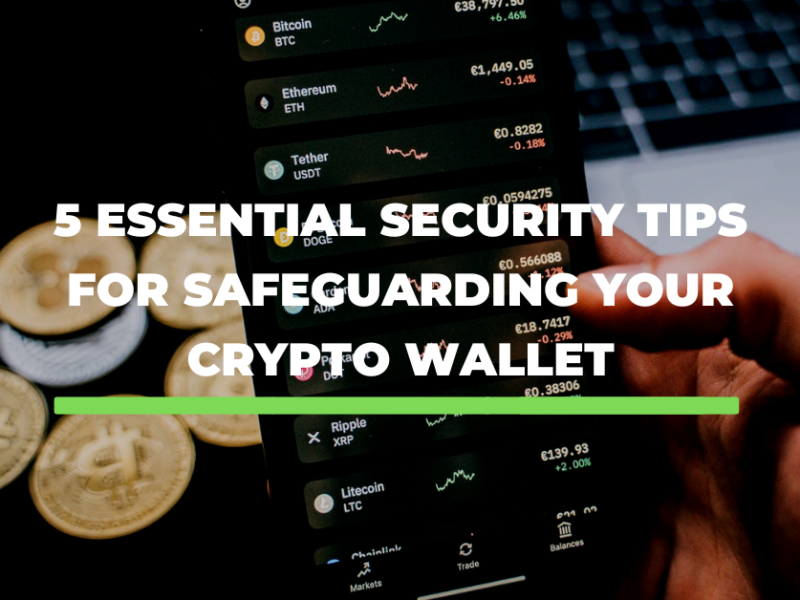As the crypto landscape continues to evolve, the security of digital assets becomes increasingly critical. In 2024, hardware wallets have emerged as indispensable tools for crypto investors, offering unparalleled protection against cyber threats. This comprehensive guide explores why hardware wallets are a must-have for anyone serious about cryptocurrency investment.

The Importance of Secure Crypto Storage
What Is a Hardware Wallet?
A hardware wallet is a physical device designed to securely store private keys, which are crucial for accessing and managing cryptocurrency. Unlike software wallets, which are connected to the internet and therefore more vulnerable to hacks, hardware wallets operate offline, providing a robust layer of security.
Why Security Matters in Crypto Investment
The decentralized nature of cryptocurrencies means that investors are responsible for their own security. With the rise in cyber-attacks and phishing schemes targeting digital assets, safeguarding your investments has never been more important. Hardware wallets offer a secure solution, ensuring your crypto holdings are protected from unauthorized access.
Key Features of Hardware Wallets
Offline Storage
One of the main advantages of hardware wallets is offline storage. By keeping your private keys offline, hardware wallets significantly reduce the risk of hacks and malware attacks that could compromise your assets.
PIN Protection and Passphrase Options
Hardware wallets often come with additional security features like PIN protection and the ability to set up a passphrase. These features add extra layers of security, making it even harder for unauthorized users to access your wallet.
Compatibility with Multiple Cryptocurrencies
Most hardware wallets support a wide range of cryptocurrencies, allowing investors to manage multiple assets within a single device. This versatility makes them a convenient and efficient choice for diverse crypto portfolios.
Popular Hardware Wallets in 2024
Ledger Nano X
The Ledger Nano X is renowned for its robust security features and user-friendly interface. It supports over 1,500 cryptocurrencies and offers Bluetooth connectivity for mobile use.
Trezor Model T
The Trezor Model T is another top choice, known for its advanced security measures and intuitive touch screen. It supports numerous cryptocurrencies and integrates with various software wallets for enhanced functionality.
SafePal S1
SafePal S1 is gaining popularity due to its affordability and comprehensive security features. It supports a wide range of digital assets and offers an air-gapped signing mechanism to protect against remote attacks.
Setting Up Your Hardware Wallet
Initial Configuration
Setting up a hardware wallet involves initializing the device, creating a PIN, and generating a recovery seed. The recovery seed is a series of words that can be used to restore your wallet if the device is lost or damaged.
Transferring Crypto Assets
Once your wallet is set up, you can transfer your crypto assets from exchanges or software wallets to your hardware wallet. This process usually involves generating a receiving address on your hardware wallet and sending the assets to this address.
Regular Maintenance and Updates
Maintaining your hardware wallet includes regularly updating the firmware to protect against new security threats and ensuring your recovery seed is stored securely in a separate location.
Enhanced Security Practices
Using Multi-Signature Wallets
A multi-signature wallet requires multiple private keys to authorize a transaction. This adds an extra layer of security, as multiple devices or approvals are needed to access your funds.
Keeping Your Recovery Seed Secure
Your recovery seed is the key to your crypto assets. Store it in a safe, offline location, and consider using a metal backup device to protect it from physical damage.
Avoiding Phishing Attacks
Be vigilant against phishing attacks. Always verify the authenticity of the websites and applications you use, and avoid clicking on suspicious links or downloading unknown software.
The Future of Hardware Wallets
Integration with Decentralized Finance (DeFi)
As DeFi continues to grow, hardware wallets are becoming increasingly integrated with DeFi platforms. This allows users to securely interact with decentralized applications (dApps) directly from their hardware wallets.
Advancements in User Experience
Manufacturers are continuously improving the user experience of hardware wallets, making them more intuitive and accessible for all types of users. Future developments may include enhanced interfaces, voice recognition, and biometric security features.
Expanding Support for New Cryptocurrencies
With the continuous emergence of new cryptocurrencies, hardware wallet providers are regularly updating their devices to support a broader range of digital assets, ensuring they remain relevant and useful for all crypto investors.
Hardware Wallets in Practice
Case Study: Successful Crypto Management
Consider the case of an investor who secured their assets using a Ledger Nano X. Despite multiple phishing attempts and malware attacks, their crypto holdings remained safe, thanks to the device’s robust security features. This highlights the importance of using a hardware wallet for long-term asset protection.
Common Mistakes to Avoid
Many investors make the mistake of not backing up their recovery seed or sharing it with others. Ensuring that you alone have access to your recovery seed and keeping it secure is crucial for maintaining the integrity of your wallet.
Expert Tips for Maximizing Security
Experts recommend regularly updating your hardware wallet’s firmware, using complex PIN codes, and considering additional security measures like multi-signature wallets and physical backups of your recovery seed.
Conclusion
In the ever-evolving world of cryptocurrency, security remains paramount. Hardware wallets provide a reliable and effective way to protect your digital assets from cyber threats. By understanding their features, benefits, and best practices for use, you can ensure your investments are safeguarded in 2024 and beyond.



Thanks for sharing this article.
Thanks
Thanks
Thanks par minmin
မင်္ဂလာပါ
မင်္ဂလာပါ
မင်္ဂလာပါ
Thanks 😍😘